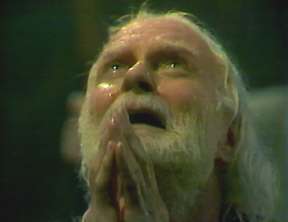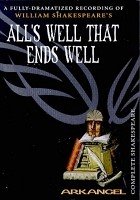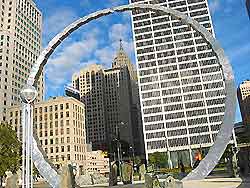 Northrop Frye on King Lear
Northrop Frye on King LearPart of a series of plays on the histories of British kings
Now seen as legends, but in days of bard they were seen as truth
Based upon Welch priest named Geoffrey of Monmouth (12th century)
Concocted a fictional history of Britain modeled on Virgil
Britain was colonized by Trojan refugees led by one Brutus
Lear is one the many kings chronicled in those writings
Lear was supposed to have lived somewhere around the 7th or 8th century before Christ
The place is thus the earliest chronological staged of Shakespeare’s works
With a setting that is so far back in time, sense of historical blurs into the sense of mythical and legendary times
Main characters expand into a gigantic, even titanic, dimension that simply wouldn’t be possible in a historical context (i.e. Henry VI)
Tensions arise from tensions between tragic structure and a framework of assumptions derived from Christianity.
Christianity is based on a myth which is comic in shape, its theme being the
salvation and redemption of man
look towards Dante and his commedia which follows this central christian myth;
story ends happily for all those who matter
Tragedy needs a hero of outsize dimensions:
Easy to get in Greek tragedy (men can descend from gods, history and
legend blend)
In Christianity there is no hero other than Christ who has a divine dimension.
Tragedy also raises some rather disturbing questions as to what type of god lies
At the centre of the universe ----> think the Gnostic gods.
Opening scene presents Gloucester and then Lear as a couple of incredibly foolish and gullible dodderers
Gloucester’s boast of how he begot Edmund makes us feel that there is credibility
to his later treachery.
It is a genuine humiliation for Goneril and Regan to make speeches of love to their father.
Lear doesn’t at any time in the play express any real affection or tenderness for
either of them.
Seems to be all about how much he’s given them, and what they ought to feel for
Him ---> a sort of bondage?
It is obvious (as speech in scene following Cordellia’s removal) that they are not
Grateful, and why should they be?
During first two acts, Lear’s collisions with his daughters steadily diminish his dignity and leave them with the dramatic honours.
Regan and Goneril never lose their cool: they are certainly harsh and unattractive women, but they have a kind of brusque common sense that bears [Lear] down every time.
Not until scene at end of second act (“shut up your doors”) that our sympathies clearly shift to Lear.
Obvious decrease from the one hundred knights that he used to have employed.
Desperate train now includes only the fool.
It is during and after the storm that the characters of the play begin to show their real nature.
This is unique in the Shakespearean world in that the characters are like chess
pieces ---> obviously black or white
three most apparent and important words in Lear are: 1) nature
2) nothing
3) fool
Nature
To understand this term it is important to examine kind of world view held by Shakespeare’s audience:
Two different types of Goddess of Nature invoked in Edmund’s first soliloquy and Lear’s curse on Goneril ---> illustrate two different concepts of this nature
People assumed that the universe was a hierarchy in which good was “up” and the bad was “down”. ---> simple metaphors, but didn’t affect their force or usefulness
At top of cosmos was the God of Christianity, whose abode was heaven
The lower heaven or sky is not heaven, but it’s the clearest visible symbol of it
The stars were made of a purer substance than this world, kept reminding us in
their circling of the planning and intelligence that went into the Creator’s
original construction
Garden of Eden was made of this same sort of stuff, except that man was meant to inhabit it.
Man fell out of this into a “lower” world, a third level into which man is now born but feels alienated from
Below this the fourth level, the demonic world.
The heaven of God is above nature, the hell of Satan below it.
The two middle levels however form this idea of nature, and thus nature has two levels. ---> the higher level we were intended to live in, and lower that we do.
Man can either attempt to rise above this level, or fall below it.
Their is no way to return to the Garden of Eden (its is gone), nor any physical return to the higher level, but their is hope to mentally get back to another level.
When we speak of nature it is important to note whether we speak of the upper human level of nature, or the environment around us.
Many things are natural to man, but not to things on the lower level
These differences illustrate the point that we are alien to this level
Edmond is commiting himself only to the lower, physical level of nature --- predators (aristocracy) and prey
Lear is cursing to the nature that includes what is natural to man (existence in which love, obedience, authority, and loyality are genuinely human.
Goneril is being cursed because her treatment of her father is “unnatural”
It should not be assumed that either of them actually are aware of the levels of nature, as this place actually predates the Christian god.
King Lear is the spookiest of the tragedies, and yet nothing explicitly supernatural or superhuman occurs. ----> We really don’t believe in Poor Toms five fiends
To Shakespeare’s audience the world of Lear would look like this:
1.World of impotent or nonexistent gods, which tend to collapse into deified
personifications of Nature or Fortune.
2. Social or human world with the elements the more enlightened can see to be essential to a human world, such as love, loyalty and authority. In particular, the world represented by Cordelia’s and Edgar’s love, Kent’s loyalty, Albany’s conscience, etc.
3. World of physical nature in which ,am os born an animal and has to follow the animal pattern of existence. (i.e. join the lions and eat well, or the sheep and get eaten)
4. A hell-world glimpsed in moments of madness or horror
Great example of this Edmund’s rejection of astrology; there’s no need for it in his nature
Storm plays a key role in that such natural disasters were thought to come from God at crucial times in human life
What it comes to symbolize in pre-Christian God times, is that Lear is moving into an order of nature that’s indifferent to human affairs.
His madness brings him insight into this new existence
With his abdication, whatever links there may be between the civilized human
world and the one above it have been severed.
Question lies now, what is a “natural man”?
Own proper human level it is natural to be clothed, sociable, and reasonable
Response to Goneril and Regan’s questions about need for all the knights, “Oh,
reason not the need” indicates that civilized life is not based simply on needs
The storm world descends him past this civilized level into the base world of
earthly nature.
Speech from Act III, iv about Poor Tom creates imagery of world worse than that
of Hamlet.
Poor Tom is a kind of ghastly parody of a free man, because he owes nothing to the amenities of civilization.
Lear starts at one end of nature and descends to the lower, with the removal of his clothes lying at the terminus.
NothingHarkens also to Richard II (see upcoming notes on this)
In both plays “nothing” seems to have the meaning of being deprived of one’s social function, and so of one’s identity.
A king who dies is still something, namely a dead king;
A king deprived of his kingship is nothing, even if he goes on living.
The train of knights to Lear represents his on-going kingship; he wants both to have and not have his royal powers.
Daughters at first don’t want to kill him, they’d prefer to let him live without power
To kill him would be murder; to let him survive without his identity is a kind of
annihilation.
Key question here, what is the cause of any of the essential human virtues (love, loyalty, etc.)?
Nothing: There is no “why” about them; they just are.
Lear is obsessed by the formula of something for something
Love and loyaty don’t have motives or expectations or cause, nor can they be quantified.
Cordelia’s answer to Lear in IV, vii “No cause, no cause” is one moment of supreme drama.
By saying this she also indicates she will have nothing to do with “these silly games”
Fool
Term is in time applied to practically every decent character in the play
Those who are not fools are people like Goneril, Regan, and Edmund who live according to the conditions of the lower or savage nature.
Albany called a “moral fool” by Goneril because he doesn’t accept this nature
Fool himself is natural ---> as a “natural” in this world, he is deficient enough, mentally, to be put in a licensed position to say what he likes.
In his kind of “natural” quality there is a reminiscence of a still coherent and divinely designed order of nature, a world in which the truth is “natural”
There is nothing funnier than sudden outspoken declaration of the truth
“Fool” here also applies itself to a victim, the kind of person to whom disaster happens
everyone who is on the wrong side of the wheel of fortune is a “fool” in this sense
Lear calls himself “the natural fool of fortune”
Gloucester is no atheist; he postulates gods, divine personalities, and if he replaced them with a mechanism of fate or destiny he couldn’t ascribe malice to it.
He feels horror of whats happened to him, and that goes beyond all human causes
Edgar and Albany are moralists
They look for human causes and assume that there are powers above who are
reacting to events as they should.
Albany is decent man, but in Goneril’s world he is weak and ineffectual
After the deaths of Goneril and Edmund he tries to postulate the workings of
providence. ---> this fails badly, as Lear launches the bombshell of Cordelia’s
death.
The Gloucester tragedy can be explained in moral terms (went into a whorehouse to beget Edmond), but the Lear cannot.
Both Edgar and Albany are fools in the sense that they are victims.
They utter the cries of bewildered men who can’t see what’s tormenting them, and
their explainations are at best random guesses.
In this dark, meaningless world, everyone is as spiritually blind (as Gloucester is physically) ---> blindness appears often throughout play.
There appears two versions of time in the play:
1) the events in the foreground summarizing slower and bigger events
2) the background events that take longer to work due to their size
An idea that seems to harken back to Richard II and Henry V: “a second fall of cursed man”
This second fall refers to the movement of man to the lower of the two states of
Nature
Storm in Act III is an image of nature dissolving into its primordial elements, losing its distinction of hierarchies in chaos. ---> a reverse crossing of the Red Sea
Central image of this descent is that of the antagonism of a younger and older generation.
Shakespeare is also playing here with the important “natural” virtue of honouring one’s parents, which in key to hereditary succession
Ambiguity in all tragedies: death is both punishment of the evil and reward for the virtuous, besides being the same end for everybody.
Edgar and Albany, the moralists, are survivors of the play and speak as though the length of human life has been shortened. (V. iii 323-26)
Language appears to the last remainants of the upper level of nature
Lear has entered a world in which the most genuine language is prophetic language: language inspired by a vision of life springing from the higher level of nature.




